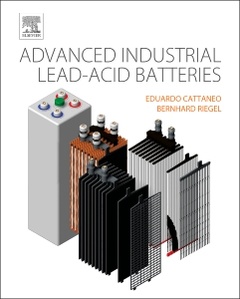Description
Advanced Industrial Lead-Acid Batteries
Advanced Industrial Lead-Acid Batteries
Authors: Cattaneo Eduardo, Riegel Bernhard, Garche Jurgen
Language: English
Approximative price 209.76 €
In Print (Delivery period: 14 days).
Add to cart462 p. · 19.1x23.5 cm · Hardback
Description
/li>Contents
/li>Readership
/li>Biography
/li>
Advanced Industrial Lead-Acid Batteries, written for technologists and engineers, presents a detailed account of the different types of reserve and motive power industrial lead-acid batteries, also including recent developments and new applications.
Lead-acid batteries (LAB) for reserve and motive power applications have, in recent years, undergone an evolutionary process triggered by novel developments in telecommunication, information technology, material handling, and renewable energy applications. This book details those advances, giving users the latest information on this rapidly advancing field.
- Presents a complete description and deployment of industrial batteries
- Gives a detailed account of all the components of industrial batteries and their functions
- Covers the most common service-life limiting factors of industrial batteries
- Includes a comprehensive list of battery testing methods, i.e., capacity and self-discharge tests
- Lists the usual parameters in battery management systems necessary for correct field function
- Provides details on all manufacturing techniques of LAB
1. Renewable Energies for power generation - Technologies, potentials, needs for balancing power 2. Classification of technologies for balancing power in grids 3. Challenges for the power supply systems - grid restrictions, demand side management, conventional power plant operation 4. Existing markets and operation profiles for grid connected storage systems - Primary control, secondary control, minute reserve, energy trading, power plant scheduling, UPS systems, self-consumption 5. Existing markets for storage systems in off-grid applications 6. Review on the need of storage capacities depending on the share of renewable energies 7. Overview about non-electrochemical storage technologies 8. Hydrogen production from renewable energies - electrolyser technologies 9. Hydrogen storage technologies 10. Hydrogen conversion into electricity and thermal use 11. Reversible fuel cell 12. Energy carriers made from hydrogen 13. Lead-Acid Battery Energy Storage 14. Ni-Cd Battery Energy Storage 15. Na+ - High Temperature Batteries Energy Storage 16. Li-Ion Battery Energy Storage 17. Redox Flow Battery Energy Storage 18. Metal storage / Metal air (Zn, Al, Mg, Li) 19. Electrochemical Double Layer Capacitors 20. System design considerations (connection to the grid, safety issues, standards, etc.) 21. Battery management and battery diagnostics 22. Power Conditioning Systems (power electronics) incl. discussion of optimum voltage levels 23. Life cycle cost calculation and comparison for different reference cases and market segments 24. "Double use" storage systems - "PV Self-Consumption" and "Vehicle to Grid"
Chemists, electrochemists, chemical engineers and material scientists in academia, government and corporate labs contacting research on electrochemical energy storage devices.
After working as a postgraduate at the physical-chemistry institute of the University of Bonn he joined in 1988 the R&D staff of HOPPECKE Batteries.
He has more than 20 years R&D experience on battery technology including published works on continuous casting of lead grids, continuous plate making, lead alloys corrosion, VRLA batteries and anodic stability of electrolytes for Lithium-ion cells
Bernhard Riegel received his PhD in inorganic chemistry at the University of Stuttgart. He worked in his postgraduate time at the Max Planck Institute for Solid state chemistry in Stuttgart, the University of Texas at Austin, followed by the Center of Solar Energy and Hydrogen Research in Ulm (ZSW).
Since 2001 he is working for HOPPECKE batteries with the responsibility as the director for Research and Development.
His major R&D experiences are in the field of electrochemistry of lead-acid, alkaline and Li-Ion batteries.
These books may interest you

Lithium-Sulfur Batteries 152.74 €



